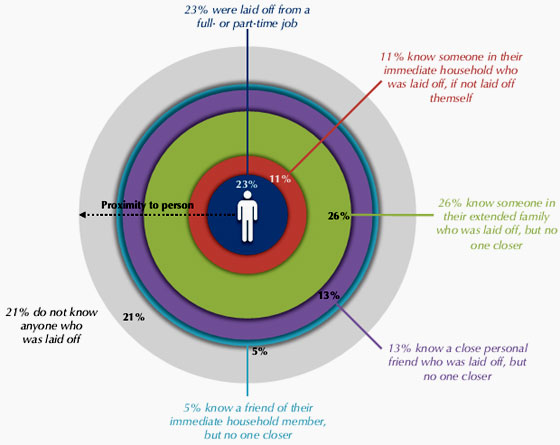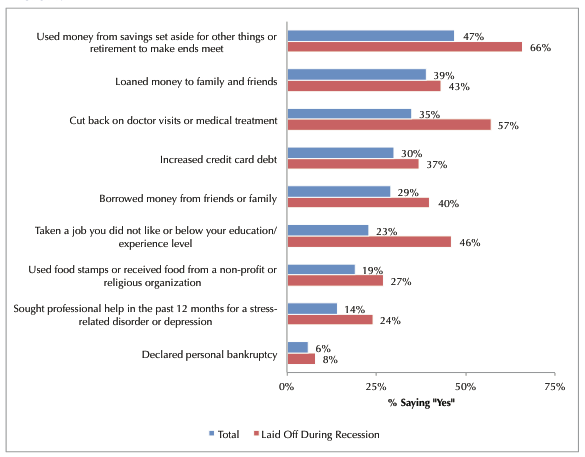General Discussion
Related: Editorials & Other Articles, Issue Forums, Alliance Forums, Region ForumsDisposable Workers: Why Throwaway Employees are Bad Policy
The media increasingly appears to define the state of the economy based on corporate bottom lines and the experience of the upper echelon, reflected in the way it glosses over the anxiety and distress outside the top 1% of the population. The fact that this disconnect isn’t a figment of our imagination was confirmed by a recent study by Edmund Saez that reported that 121% of the income gains from 2009 to 2011 went to the top 1%, meaning they pulled further ahead while everyone else (in aggregate) became worse off. The big cause is the state of the labor market. And that isn’t just a product of the global crisis but also of a long-term restructuring of the relationship between employers and employees.One of the pet ideas of neoliberalism is to encourage “labor market flexibility” which is code for letting companies fire employees on a whim. The problem is that a quick to hire, quick to fire posture is not a terribly sound idea. It takes a lot of time and effort to hire and train people (yes, Virginia, even a skilled employee needs to learn the quirks of how his employer likes things done), so firing people casually means a loss of this investment. Export powerhouse Germany has not been competitively impaired by its restrictions on terminating employees. But while some businesses actually believe the HR trope that “employees are our most important asset”, most, to adopt an image from Robert Oak at the Economic Populist, treat them as disposables.
McKinsey took note of this development in the early 2000s, when a study they commissioned from Yankelovich determined that new college graduates could expect to have 11 jobs by the age of 38. How can you plan any spending, much the less sensibly commit to buying a house or raising a family, with that much income uncertainty? Multiply that across most of the economy and no wonder this “expansion” is so sluggish.
A recent report by Mark Szeltner, Carl Van Horn, and Cliff Zukin of the Heldrich Center at Rutgers, Diminished Lives and Futures: A Portrait of America in the Great-Recession Era, shows how far this trend has gone in the downturn.


Look at that chart closely. People are draining their retirement accounts, neglecting medical care, and relying on food stamps to get by. Yet we read much more about how the economy (read the bottom lines of public companies) is getting better...
While this report has gotten media coverage, most mainstream sources have tended to focus on one aspect, perhaps because the totality is too much of a downer. I strongly encourage you read the entire report, since it will provides some badly-needed insight into conditions on the unemployment line.
Read more at http://www.nakedcapitalism.com/2013/02/disposable-workers-why-throwaway-employees-are-bad-policy.html#k2tWzgxmGQSEuB3b.99
Read more at http://www.nakedcapitalism.com/2013/02/disposable-workers-why-throwaway-employees-are-bad-policy.html#k2tWzgxmGQSEuB3b.99
JCMach1
(27,582 posts)exactly what corporations were looking for...
Victor_c3
(3,557 posts)Buns_of_Fire
(17,202 posts)If your entire "job" is keeping track of your investments, you're a valued member of his "society". If not, well, that's too bad, you insignificant flea on the butt of Ayn Rand. Oh, and peel me a grape, you worthless peon.
http://maddowblog.msnbc.com/_news/2012/04/02/10984256-ownership-society-becomes-opportunity-society?lite
quaker bill
(8,225 posts)Where I work we issue construction permits. Applications have increased, specifically new subdivision applications. I personally deal with public complaints and environmental violations related to the construction process. Over the last 6 or 8 weeks I have been getting regular and almost daily complaints about large yellow equipment clearing trees and moving dirt again. This is a sudden change in that I have only had a handful of such complaints over the last 4 years.
The construction industry has been a big driver in our local economy for the last 20 - 30 years. It dried up for 2 years during the S&L collapse, and nearly 5 years this time, but suddenly it is back.
It is just starting as ours is the only one of the 4 agency offices to see this. This is not unusual as we have always led the pack in this regard.
It will take a while for this to show up in the statistics, but I can see it in the ground. It will take a while before the re-employed spend enough for the impact to reach other sectors, but that is coming as well.
It seems that with the election decided folks are now making business decisions. Hanging out and waiting another 4 years for a republican President is not the option they are choosing.